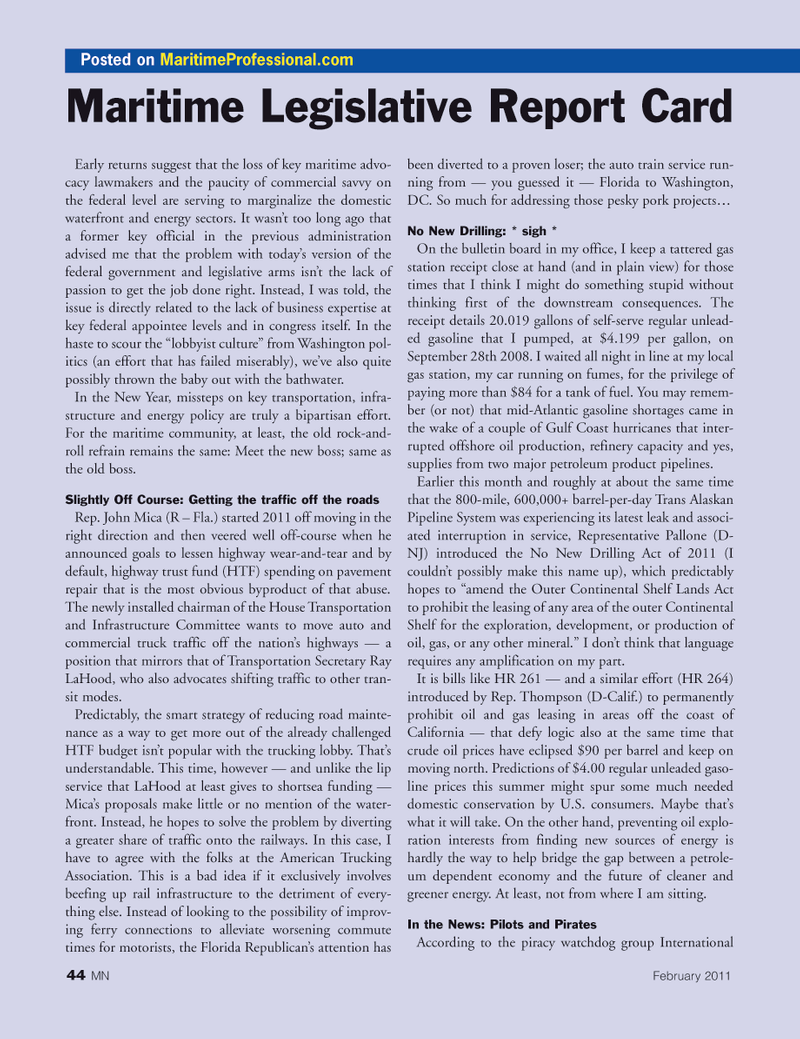
Page 44: of Marine News Magazine (February 2011)
Inland Waterways
Read this page in Pdf, Flash or Html5 edition of February 2011 Marine News Magazine
44 MN February 2011
Posted on MaritimeProfessional.com
Early returns suggest that the loss of key maritime advo- cacy lawmakers and the paucity of commercial savvy on the federal level are serving to marginalize the domestic waterfront and energy sectors. It wasn’t too long ago that a former key official in the previous administration advised me that the problem with today’s version of the federal government and legislative arms isn’t the lack of passion to get the job done right. Instead, I was told, the issue is directly related to the lack of business expertise at key federal appointee levels and in congress itself. In the haste to scour the “lobbyist culture” from Washington pol- itics (an effort that has failed miserably), we’ve also quite possibly thrown the baby out with the bathwater.
In the New Year, missteps on key transportation, infra- structure and energy policy are truly a bipartisan effort.
For the maritime community, at least, the old rock-and- roll refrain remains the same: Meet the new boss; same as the old boss.
Slightly Off Course: Getting the traffic off the roads
Rep. John Mica (R – Fla.) started 2011 off moving in the right direction and then veered well off-course when he announced goals to lessen highway wear-and-tear and by default, highway trust fund (HTF) spending on pavement repair that is the most obvious byproduct of that abuse.
The newly installed chairman of the House Transportation and Infrastructure Committee wants to move auto and commercial truck traffic off the nation’s highways — a position that mirrors that of Transportation Secretary Ray
LaHood, who also advocates shifting traffic to other tran- sit modes.
Predictably, the smart strategy of reducing road mainte- nance as a way to get more out of the already challenged
HTF budget isn’t popular with the trucking lobby. That’s understandable. This time, however — and unlike the lip service that LaHood at least gives to shortsea funding —
Mica’s proposals make little or no mention of the water- front. Instead, he hopes to solve the problem by diverting a greater share of traffic onto the railways. In this case, I have to agree with the folks at the American Trucking
Association. This is a bad idea if it exclusively involves beefing up rail infrastructure to the detriment of every- thing else. Instead of looking to the possibility of improv- ing ferry connections to alleviate worsening commute times for motorists, the Florida Republican’s attention has been diverted to a proven loser; the auto train service run- ning from — you guessed it — Florida to Washington,
DC. So much for addressing those pesky pork projects….
No New Drilling: * sigh *
On the bulletin board in my office, I keep a tattered gas station receipt close at hand (and in plain view) for those times that I think I might do something stupid without thinking first of the downstream consequences. The receipt details 20.019 gallons of self-serve regular unlead- ed gasoline that I pumped, at $4.199 per gallon, on
September 28th 2008. I waited all night in line at my local gas station, my car running on fumes, for the privilege of paying more than $84 for a tank of fuel. You may remem- ber (or not) that mid-Atlantic gasoline shortages came in the wake of a couple of Gulf Coast hurricanes that inter- rupted offshore oil production, refinery capacity and yes, supplies from two major petroleum product pipelines.
Earlier this month and roughly at about the same time that the 800-mile, 600,000+ barrel-per-day Trans Alaskan
Pipeline System was experiencing its latest leak and associ- ated interruption in service, Representative Pallone (D-
NJ) introduced the No New Drilling Act of 2011 (I couldn’t possibly make this name up), which predictably hopes to “amend the Outer Continental Shelf Lands Act to prohibit the leasing of any area of the outer Continental
Shelf for the exploration, development, or production of oil, gas, or any other mineral.” I don’t think that language requires any amplification on my part.
It is bills like HR 261 — and a similar effort (HR 264) introduced by Rep. Thompson (D-Calif.) to permanently prohibit oil and gas leasing in areas off the coast of
California — that defy logic also at the same time that crude oil prices have eclipsed $90 per barrel and keep on moving north. Predictions of $4.00 regular unleaded gaso- line prices this summer might spur some much needed domestic conservation by U.S. consumers. Maybe that’s what it will take. On the other hand, preventing oil explo- ration interests from finding new sources of energy is hardly the way to help bridge the gap between a petrole- um dependent economy and the future of cleaner and greener energy. At least, not from where I am sitting.
In the News: Pilots and Pirates
According to the piracy watchdog group International
Maritime Legislative Report Card

 43
43

 45
45
